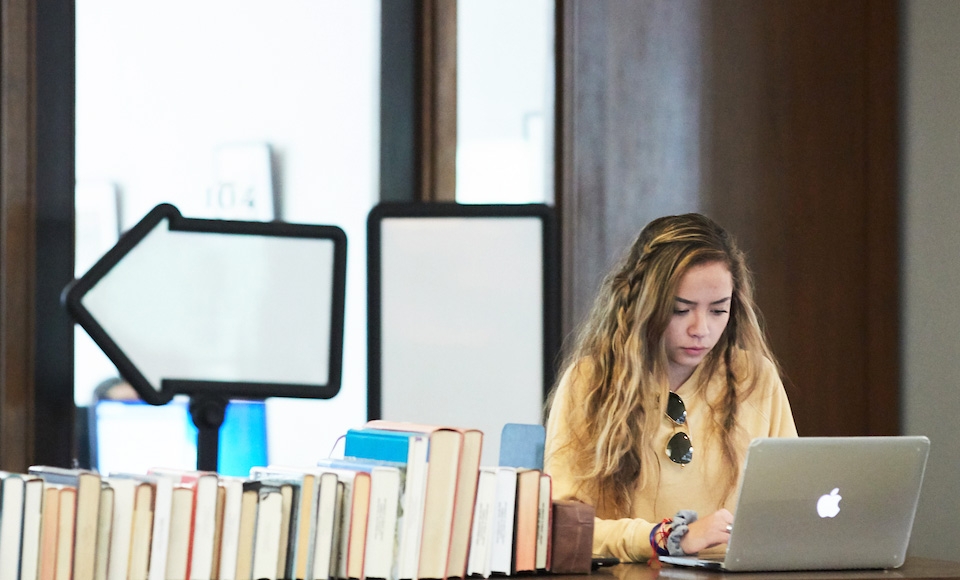Breadcrumbs
- News
- News Archive
- Education Dept. Partners With County In Developmental Series For K-12 Teachers

Dominican’s Department of Education has partnered with the Marin County Office of Education to launch a professional development series to support Marin’s K-12 teachers with distance learning.
The virtual learning courses are led by Dr. Katie Lewis, Ph.D., assistant professor and director of the Multiple Subject Credential Program, and Dr. Rebecca Birch, Ph.D. assistant professor and director of the Single Subject Credential Program. Both are involved with research focused on remote learning. Willow Horn, a Master of Science (MS) in Education candidate, is leading the section on Google Classroom, which she already uses as a teacher in the Bolinas-Stinson School District.
Several weeks ago, the Marin County Office of Education (MCOE) contacted Dr. Gigi Gokcek, Interim Dean of the School of Liberal Arts and Education, to see if the University could collaborate to support teachers with virtual learning.
“We immediately said yes,” Dr. Lewis says.
Drs. Lewis and Birch held a brainstorming session with MCOE to determine how best to support Marin’s educators through this time of change.
“We agreed to create a model that would give very focused and short courses,” Dr. Lewis says. “This would allow the teachers to quickly grasp information, implement, and reflect.”
Request Info About Dominican’s Teacher Credential Programs
Preliminary outreach also revealed that local teachers were particularly interested in learning how to best use videoconferencing tools, including Zoom and Google Meet, in order to create synchronous classroom sessions.
“When talking with MCOE, we wanted to get a good feel for what the teachers were doing with distance learning and what support they needed,” Dr. Lewis says. “We gathered that many of the schools were using Google Classroom, but that teachers would like to start using Zoom or Google Meet to better connect with students.”
The Dominican/MCOE series consists of seven courses, with two 20-minute sessions equaling one virtual learning course. The courses are open to all Marin teachers for either no fee or a low fee for those wanting to earn Continuing Education Units (CEUs). Following each session, CEU participants are required to practice and implement their new skills in their own classroom for about four hours throughout the week and then write a short paper in order to reflect on what they tried —– what worked, what did not, and what questions they still have.
The demand has exceeded everyone’s expectations. Originally Dr. Lewis expected about 20-30 teachers would sign up. The first class, held on April 16th, had 96 participants. To date, more than 180 teachers have signed up for future sessions.
“The demand confirms the need for support during these times,” Dr. Birch says. “Due to the COVID-19, teachers have been asked to abruptly change their mode of instruction and at the same time create an environment in which students are engaged, feel welcomed, and continue to meet their subject and grade-level state standards.”
In March, Drs. Lewis and Birch led a similar series of virtual learning courses for Dominican’s faculty and staff in preparation for all spring semester courses moving online following the shelter-in-place order. More than 30 faculty and staff participated across the sessions.
Drs. Lewis and Birch are collaborating on research about what is the most effective pedagogy for online spaces. Both also have been using Zoom and other virtual learning and video conferencing platforms in their coursework at Dominican. Beginning this fall, most of Dominican’s graduate-level education courses in the Department of Education are offered on a hybrid basis — a mix of in-person and online instruction. They are now all online.
In Spring 2019, after running sessions on Google Suite and Moodle, they were impressed by the outcomes and wanted to further explore online delivery but they knew that they had to infuse a very important Dominican element into the delivery: Community.
Dr. Lewis explains: “As experienced teachers, we know that community-building is an essential component of best teaching practices and, so, as the spring semester began, our conversations were framed around this question—How do we create and maintain a strong sense of community in online spaces?”
Zoom, Dr. Lewis says, has been particularly beneficial when it comes to helping instructors hone effective teaching practices for these virtual spaces. This semester, Drs. Lewis and Birch are teaching their students at Dominican to not only incorporate Zoom into their teaching, but also to best humanize virtual learning routines and relationships.
Using Zoom break out rooms allows students to connect with each other in smaller groups, process their work, and then bring their work to the larger group for discussion.
“It is important to build in regular video meetings with students,” Dr. Lewis says. “It also is important to connect with students and help them connect with each other through breakout rooms. Break out rooms allow students to connect in smaller groups, process information, and then bring their work to the larger group for discussion. It’s a very effective tool.”